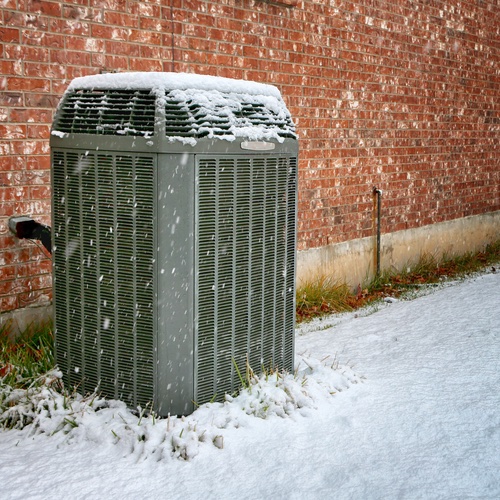
When it comes to heating your home, you have a few different options to choose from. Two of the most popular options are heat pump vs. gas furnace. While both types of systems are effective at heating your home, there are some key differences to consider when deciding which one is right for you. In this post, I’ll put them head to head so you can compare costs and effectiveness.
Heat Pumps
A heat pump is an electric system that uses refrigerant to transfer heat from one place to another. In the winter, a heat pump absorbs heat from the outside air and pumps it into your home. Even if it doesn’t feel warm outside there is enough heat for the heat pump to do its job. In the summer, it works in the opposite way, absorbing heat from your home and releasing it outside.
This is the same system most people use for air conditioning except that in the winter the heat pump reverses the flow and instead of blowing hot air outside and cool air inside it uses the refrigerant to move the hot air inside and cold air outside.
Advantages of a Heat Pump
One of the main advantages of a heat pump is its energy efficiency. Because it works by transferring heat rather than generating it, it requires less energy to operate. This can result in lower energy bills and a smaller carbon footprint. Heat pumps are also versatile, as they can be used for both heating and cooling.
Disadvantages of a Heat Pump
Since they don’t generate their own heat, heat pumps don’t perform well below certain temperatures. According to Cagel Service, an HVAC contractor in Jackson, TN heat pumps are most efficient and effective in temps from 50-65ºF.
“They are still effective in the 40’s and even down into the 30’s, but once the temperature outside drops below 32ºF, you will probably notice a significant drop in the heating ability of a heat pump.”
The solution to that is the addition of auxiliary heat strips, (think a hairdryer) that supplement the heat pump during low temperatures. These are standard in most heat pumps. This will keep you warm, but it’s not nearly as energy efficient as using just the heat pump. They typically kick in automatically when the heat pump needs the assist.
Heat pumps work best in southern and coastal climates where you don’t get deep plunges in temperatures during the winter. Once you get north of the Mason-Dixon line or into the nation’s interior you’ll need a different heater for effectiveness.
Heat Pump Costs
According to HomeAdvisor.com the average cost nationwide to install a new heat pump is $5,892. which is more expensive than a gas furnace. A lot of the cost will depend on the size of the unit which is rated in “tons.” An average 1500 SF house need one 3-ton heat pump which is what the average cost above figures in, but if your home has multiple units or is larger you need to take that into account.
The efficiency of your unit will also play a major role in how much the equipment costs. Heat pumps are rated the same as air conditioners using a SEER rating. To learn more about SEER ratings read here. The minimum rating to be considered a Energy Star qualified system would be 14 SEER, but most systems today are 15 SEER or great. The higher the SEER number goes the more efficient the model you are looking at.
Gas Furnaces
A gas furnace, on the other hand, uses natural gas or propane to generate heat. Compared to oil or coal heaters they are an incredibly effective and clean form of home heat.
Advantages of Gas Furnaces
A gas furnace is more efficient at producing heat than an electric furnace, and it can often heat a home more quickly than a heat pump. It doesn’t matter what the temperature is outside or inside as long as the supply of gas and electricity aren’t interrupted you’ll have a steady supply of warm air with a gas furnace. Plus, unlike a heat pump it is just as efficient at 50ºF as it is at -30ºF.
Disadvantages of Gas Furnaces
A gas furnace, however, it is not as efficient at converting energy into heat as a heat pump, so it may have higher energy costs especially in regions where the winters are mild.
Gas furnaces are also not suitable for use in areas where natural gas or propane is not available. If natural gas isn’t run to your home or you’re not allowed to have a large propane tank on your property then you are out of luck.
Gas furnaces also require proper venting since they are burning combustible materials, and that venting may be a challenge depending on where the furnace can be located within your home.
Gas Furnace Costs
According to HomeAdvisor.com the average cost nationwide to install a new gas furnace is $4,691, but the price will vary greatly depending on the equipment you choose and the state of your current heating plant.
Gas furnaces are rated (and priced) by their efficiency so finding a model with higher efficiency rating will cost you more upfront but will cut down on your monthly gas bill as it generates heat more effectively with less fuel.
A gas furnace with an AFUE of 90 or higher is considered a high-efficiency furnace, though furnaces today can reach efficiencies of up to 98.5 percent. To qualify for the Energy Star label, a furnace must have an AFUE of 90 percent or higher. Check local costs of natural gas or propane in your area and you’ll get a sense of the costs.
So, which option is right for you? The decision will depend on your specific needs and circumstances. If you live in an area with mild winters, a heat pump may be the more cost-effective and energy-efficient option. However, if you live in a colder climate, a gas furnace may be a better choice for keeping your home warm.
From personal experience in Florida I have had a home with a heat pump and a different home with a natural gas furnace. With electricity rates much higher than natural gas costs in my state the cost to heat my home in the winter with a gas furnace was incredibly cheap compared to the costs to heat with a heat pump even with the mild winter.
Ultimately, the best choice for you will depend on factors such as the climate in your area, the size of your home, and your budget. It’s always a good idea to consult with a professional HVAC technician to help you determine the best heating system for your home.

Founder & Editor-in-Chief
I love old houses, working with my hands, and teaching others the excitment of doing it yourself! Everything is teachable if you only give it the chance.


Up north here (also in MA), there is a big push to convert to heat pumps. Lots of discourse and incentives coming into play. The problems I’ve read about are:
1. not always great in colder temps, but technology is getting better, so this is less of a problem.
2. there aren’t enough qualified heat pump installers who really know the equipment and what they are doing. This is a big problem here because getting good advice is tricky.
3. Expensive for older homes 100+ years, with or without ducting.
4. Many like myself worry about rising electricity prices. Electric has always been more expensive than gas.
I don’t see much critical thinking in our rush to electrify. I can’t imagine the refrigerant in heat pumps won’t pose a disposal problem eventually, and with everyone charging their giant electric cars and trucks, where is this electricity going to come from?
I believe if you can do solar, it’s the better option. After the initial cost, the sun is free, and you don’t have to worry about keeping shareholders of some power company rich. Unfortunately, we have a slate roof and can’t install solar. We switched to gas 25 years ago when there were incredible incentives, and the environmental impact was less well known. This year, my heat is now down to 60 degrees all the time because of the rising cost of gas. My bills have doubled.
Not covered is the maintenance issue. I am not an HVAC person, but 20 years ago I installed by myself a single phase 80 % efficient propane gas furnace. Two circuit boards and three inducer blowers later the unit still works. Maintenance and diagnostics is not real complicated on this 60,000 btu Goodman furnace that I paid less than $400.00 for when it was new. May have been an ‘at cost’ transaction. I’m willing to pay the extra energy cost for the low maintenance experience.
In a northern mild climate (North Carolina, for example) you also need an air conditioner – so a heat pump, providing both functions, makes sense if you are starting from scratch. One unit, 2 functions. Or did I miss something?
For what it’s worth, we’re in western Massachusetts, and are using a heat pump as our primary heating source down to 10 degrees. The Ecoer unit we got is rated to run down to -5 or so. We do have a configurable cut-over to the oil burner; I got the unit’s spec sheet from Ecoer and gave it to an engineering friend to translate for me; his advice was to have it cut over at 10 and, once we get solar or when the price of gas goes up, put it as low as we can.
We have a 228 year old colonial, and so we keep it a pretty chilly 62 unless we have guests coming – but the pump has no issues keeping up with that heat, at least. The fan is going pretty fast as it gets closer to 10 degrees, but no issues.
Of course, everyone’s mileage may vary, but I don’t think the heat pumps are necessarily only of benefit in warmer climes.
Agreed — the information provided by the HVAC technician is quite out of date.
According to Consumer Reports, heat pumps can function well below freezing (links below).
https://www.thisoldhouse.com/heating-cooling/21016321/heat-pump-advances
https://www.consumerreports.org/heat-pumps/can-heat-pumps-actually-work-in-cold-climates-a4929629430/
Agreed, what the HVAC tech is saying is very out of date, but that seems to be very very common. I feel like a lot of them must have tried it once a decade or more ago and had issues with it, or the units they’ve tried aren’t meant for colder climates.
We have a Bosch central heatpump installed in our 250 year old colonial in Western Massachusetts as well and have the same switch over temperature of 10f. Now it will basically run 24/7 to keep the house at 70f at that temperature, but with the current propane and electricity rates its still the cheaper option across most of its operating range.